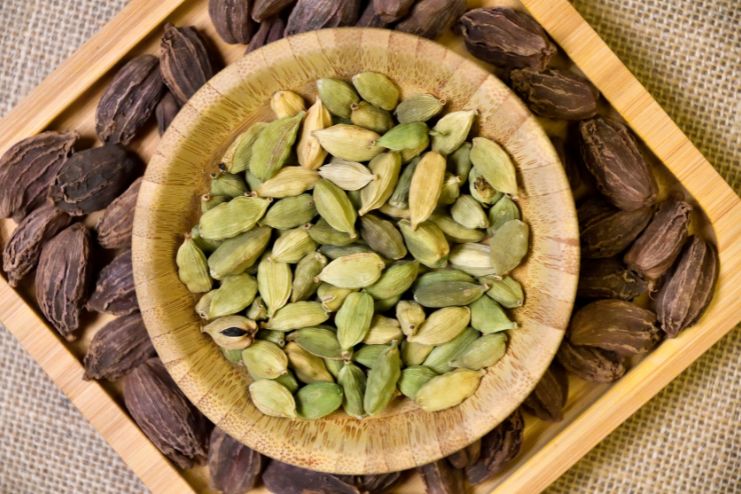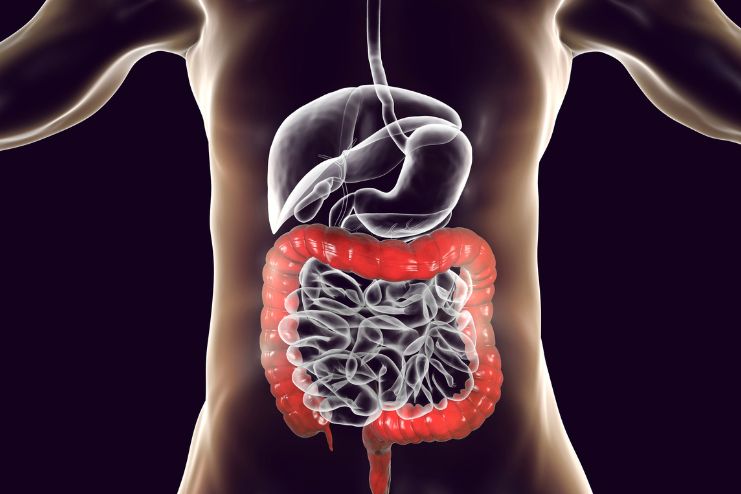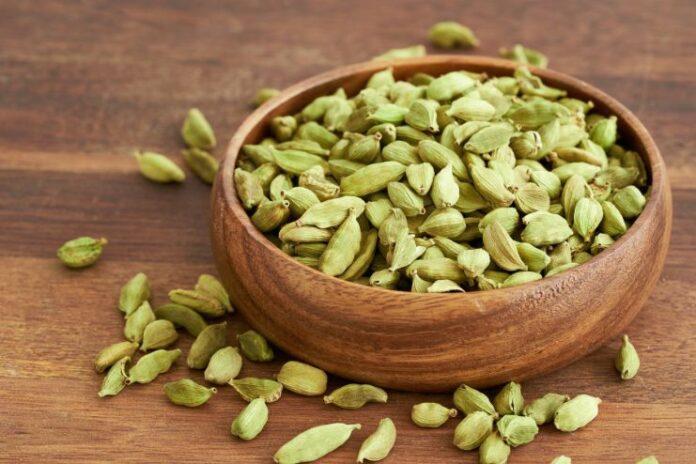If you are constantly deal with bloating, there’s one aromatic spice in your kitchen that might help—cardamom.
Used for centuries in Ayurvedic medicine, cardamom isn’t just a fragrant addition to a chai latte or a spiced dish—it’s a time-tested digestive aid. Modern science is also catching up, with research now highlighting this spice as a natural remedy for bloating and supporting gut health.
In this article, let’s understand how cardamom helps digestion. We will also explore the benefits and why it’s gaining popularity as a bloating remedy. And that’s not all — we’ll also share a few tips on how to include cardamom in your daily diet. Sounds interesting? Let’s read ahead!
Read More: 10 Essential Oils For Nausea That Work Wonders
What Is Cardamom?

Cardamom is a spice obtained from the seeds of plants belonging to the Elettaria and Amomum genera, which are part of the ginger family (Zingiberaceae). Cardamom is known for having a warm, light pungency and a distinct aroma.
Cardamom exists in two primary forms—green and black. Both originate in India and are commonly used in Indian and Middle Eastern cuisines.
Due to its sweet-spicy smell and strong taste, cardamom enhances the flavors of sweets, teas, curries, and even coffee. Apart from its culinary purpose, this spice is rich in antioxidants and phytonutrients that aid in digestion, quell inflammation, and calm the gut lining.
Read More: How to Get Rid of Gas: Remedies to Get Rid of Gas
How Cardamom Helps Reduce Bloating

If you’re wondering, “Does cardamom help digestion and reduce bloating?”—the answer is yes, and its effects go deeper than you’d expect. As one of the best natural remedies for bloating, cardamom works on multiple levels to ease digestive distress and support a flatter, more comfortable stomach. Here’s how this ancient spice does its magic:
1. Stimulates Digestive Enzymes:
Cardamom has been a part of traditional Ayurvedic bloating remedies for centuries. This is because it promotes the secretion of digestive enzymes. These enzymes help in breaking down difficult foods, especially proteins and fats, more effectively.
If digestion is slow, leftover food will ferment in the intestines, creating gas, bloating, and fullness. With increased enzymatic activity, cardamom helps in the smooth passage of food through the digestive system, reducing bloating. This makes it one of the best spices for a flat stomach when used consistently.
2. Serves as a Carminative:
A carminative is a substance that helps expel gas from the intestines, and cardamom is particularly effective in this role. Its essential oils, particularly cineole, calm the intestinal muscles and let excess air escape without discomfort or pressure.
If you have eaten too much or consumed something that caused discomfort, cardamom helps relieve the symptoms. That’s why most herbalists prescribe cardamom for bloating and gas, particularly in combination with other carminative herbs such as ginger or fennel.

3. Relaxes Intestinal Muscles:
Cramping and bloating often go hand-in-hand. Cardamom contains compounds that have a mild antispasmodic effect, which means it can relax the smooth muscles of the gastrointestinal tract. This helps prevent or reduce the painful spasms that often accompany bloating and irritable bowel episodes.
A relaxed gut moves more efficiently, leading to the accumulation of less gas and greater digestive ease.
4. Serves as a Natural Diuretic:
Sometimes what feels like bloating is water retention, especially around the belly. Cardamom acts as a mild diuretic, promoting the release of excess water and sodium from the body through urination. This helps reduce puffiness and that uncomfortable “swollen” feeling, particularly after salty meals or during hormonal fluctuations.
If you’re looking for ways to reduce bloating naturally, use cardamom. It helps flush out extra water and offers a noticeable feeling of lightness after consuming it a few times.
Read More: Best Natural Diuretic Foods
5. Soothes Gut Inflammation:
Chronic gut inflammation may result in bloating, discomfort, and impaired nutrient absorption. Cardamom essential oils have strong anti-inflammatory and antioxidant effects that soothe inflamed tissues in the digestive system. This is especially beneficial for individuals who experience food sensitivities or digestive issues linked to inflammation.
By soothing the gut lining, cardamom supports not only improved digestion but also a more balanced, less reactive digestive environment, promoting a flatter belly and optimal gut health.
In both classic Ayurvedic literature and contemporary wellness regimens, cardamom is trusted for its soothing, anti-bloating effects. DPU Ayurveda highlights cardamom as one of the best everyday spices used to relieve bloating and ease digestion.
Science-Backed Benefits of Cardamom
Below are several science-supported benefits of cardamom:
-
Reduces Symptoms of IBS (Irritable Bowel Syndrome):
Cardamom’s relaxing action on the digestive system makes it a natural choice for treating IBS-associated symptoms such as gas, bloating, and cramping. Soothing intestinal spasms and aiding smoother bowel movements lessen the erratic discomfort felt by most IBS patients.
-
Eases Digestive Spasms and Discomfort:
Its natural antispasmodic properties relax the involuntary muscles of the gastrointestinal tract, making it easier for trapped gas to move through the intestines. This not only alleviates bloating but also prevents the sharp, stabbing pains that often accompany digestive spasms.

-
Helps Protect Against Stomach Ulcers:
The active antioxidant and anti-inflammatory constituents of cardamom, including flavonoids and polyphenols, protect the lining of the stomach from irritation brought about by stress, NSAIDs, or infection with H. pylori.
This protective effect can prevent the formation of ulcers and suppress acidity-related symptoms such as burning and indigestion.
-
Supports Bile Flow for Enhanced Fat Digestion:
Cardamom aids in stimulating the liver to secrete and release bile, a digestive juice that is necessary to break down fat. Through increased bile secretion, it relieves fullness and bloating feeling after a heavy meal. By boosting bile secretion it helps relieve the feeling of fullness and bloating after a heavy meal. Cardamom can also increase metabolism, control appetite, and improve digestion.
How to Use Cardamom to Relieve Bloating

Do you wish to include this herbal powerhouse in your life? Here are a few easy ways to use cardamom to alleviate gas and bloating:
1. Cardamom Tea for Digestion:
- Crush 2–3 green cardamom pods.
- Steep in hot water for 5–10 minutes.
- Drink this tea after meals to calm the stomach.
This soothing herbal tea is one of the most effective Ayurvedic remedies to relieve bloating.
2. Add to Meals:
- Add cardamom powder to smoothies, oatmeal, or yogurt.
- Insert whole pods in rice or lentil preparations for flavor and gut benefits.
3. Chew Cardamom Pods:
According to Lybrate, chewing 2–3 pods after meals can reduce bloating and freshen breath
4. Combine with Other Herbs:
Mix cardamom with fennel, cumin, or ginger to make a strong digestive carminative blend. Such blends soothe the gut while relieving bloating.
Read More: Gut Health Hacks: The Best Morning Foods to Kickstart Digestion
When to Use It and Who Should Be Cautious
Incorporating cardamom in your daily life has significant health benefits, including relief from bloating. Let’s explore the best time to use it and know more about who should avoid it.
Best times to use cardamom:
- Following heavy, greasy, or gas-forming meals.
- When experiencing bloating, cramping, or lethargy.
- As a part of your evening wind-down, to relax and digest at bedtime.
Who should be cautious:
- People with gallstones—cardamom may increase bile secretion.
- People with GERD or acid reflux—cardamom might worsen symptoms in sensitive patients.
Always consult your healthcare provider if you have underlying digestive disorders or take medications.
Conclusion

Cardamom is more than a tasty spice in your pantry—it’s among the most effective natural treatments for bloating. With thousands of years of use in Ayurvedic medicine and growing scientific evidence, it’s a trusted ally for your gut.
Cardamom discreetly helps your digestion in multiple ways. It increases the production of digestive enzymes and improves fat metabolism, so your body digests food better. At the same time, it gently relieves gas, soothes abdominal cramps, and eases that heavy, bloated feeling after meals. Its mild diuretic action helps flush out excess water, while its anti-inflammatory compounds calm the gut lining, reducing bloating.
Cardamom’s beauty is in its simplicity: steep it into tea, stir it into food, or mix it with herbs such as fennel or ginger for a calming digestive tea. Use it for a day, just a week even, and you’ll be surprised at how much lighter and more balanced your stomach feels.
References
- https://en.wikipedia.org/wiki/Cardamom
- https://ayurved.dpu.edu.in/blogs/ayurvedic-health-benefits-of-cardamom
- https://www.healthshots.com/healthy-eating/superfoods/7-science-backed-reasons-why-the-good-old-elaichi-needs-to-make-a-comeback-in-your-diet/
- https://onlinelibrary.wiley.com/doi/full/10.1002/fsn3.3738
- https://www.lybrate.com/topic/cardamom-a-magical-herb-to-relieve-flatulence/04ddfa1e3e772979816079e40f521b51
- https://www.rxlist.com/supplements/cardamom.htm
- https://www.itcstore.in/blog/benefits-of-cardamom-spice
In this Article
















